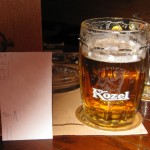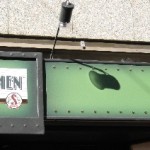
A wonderful example of 'Czenglish'! © Sybille Yates
One of the joys of living in Prague is being able to ‘eat out’ in one of the very many bar-restaurants that abound here. Provided you avoid the expensive ‘tourist traps’ in the centre of the city, prices are extremely reasonable, so much so, that some single people have told me that it is often cheaper for them to ‘eat out’ rather than try & cook for themselves at home. However, there are noticeable cultural differences between Britain and the Czech Republic in the way that you order, are served and pay for your drinks &/or meal.
As in Britain, most bars also serve food. But even if you go to a bar-restaurant just for a drink, do NOT go to the bar itself and say “I’d like two beers please”. No – go in and sit down at one of the free tables and wait until the barman/lady comes to you. If you just want a beer, taking a beer mat from the container in the middle of the table and putting it down in front of you, will indicate fairly clearly what you want. And if you forget to do this before your beer arrives, then the barman/lady will do it for you, before placing your beer in front of you. In the Czech Republic, beer glasses have to be placed on beer mats!
Do not try to pay for your beer when it is served to you. No – wait until you have finished drinking and are ready to leave. This may of course, be several rounds of drinks later. However, the person who has served you will have kept track of what you have had, either behind the bar or on a strip of paper left on the table on which the number of beers served will be marked. Saying “Zaplatim prosim” (may I pay please), will produce a bill which you then settle.
If you want to eat, do exactly the same as you would if you just want to drink. Go in, choose a vacant table and sit down. Only in slightly more upmarket restaurants will you be met at the door, asked how many people there are, and then be directed to a suitable table.
Czech menus have a number of interesting characteristics. For any meat dish, the exact weight of the meat will be specified such as 200 grams of pork, or 150 grams of chicken. There is of course, no way to check whether you actually are served 200 grams of pork rather than 191 grams of pork as scales are not provided! Often a meat dish will be served with little else other than a small salad garnish. Therefore you need to go to the ‘side dishes’ section of the menu where various forms of potato, together with other vegetables, will be listed. The advantage of this system is that you can choose almost exactly what you want to eat.
Prague is a city that is geared to visiting tourists. Therefore nearly every bar-restaurant has their menu not only in Czech, but also in English, German & sometimes also in Russian. But this is where you encounter a wonderful language which I have christened ‘Czenglish’. Very rarely do Sybille & I visit a new restaurant without descending into fits of laughter at the interesting English used to describe certain dishes. The menu on a Prague restaurant window shown in the photo at the head of this post left us creased up with laughter when we saw it last Monday. Clearly the bread to accompany the potato soup had been taken to Church and blessed prior to being served!
Czech people tend to be very particular regarding their own language and quickly correct anyone who dares to conjugates a verb or noun incorrectly. Yet they seem oblivious to the multiple mistakes that are contained within the English version of so many menus. My English Czech-speaking friend & Churchwarden Gerry Turner told me that he offered once to correct the English on the menu of a restaurant he regularly frequents in return for a free meal. The offer was refused point blank as the restaurant owner could see no reason for doing so.
There are two other cultural peculiarities that I experience every time I eat in a bar-restaurant in Prague. The first is the absence of place settings. Instead, soon after you have placed your order, a plate or upright container will be brought to your table containing your cutlery and paper serviettes. You take what you need from the plate/container and create your own place setting. The second is that, as soon as one person has finished eating, immediately a waiter will appear and whip their empty plate away, regardless of the fact that other people sitting with them are still eating. The reasoning behind this practice I have yet to discover but it happens everywhere we eat.
Normally in the UK, once everyone has finished their main course, the dirty plates and cutlery will be removed from the table and the dessert and coffee menu will be offered. Yet here in the Czech Republic, despite desserts (often the Czenglish ‘deserts’!!) being available, the opportunity to order them is rarely offered. If you want to have a dessert, you often have to specifically ask for the return of the menu in order to be able to decide what you want and place your order.
This post is my contribution to World Blog Surf Day being organised by Sher. Please read the next expat blogger in the chain by going to empty nest expat who is my friend Karen, currently back in the US of A but hopefully returning to Prague very soon once her work permit and visa problems are resolved. I am also asked to link to Anastasia Ashman who is an American cultural producer based in Istanbul, and is a creator of Expat Harem, the anthology by foreign women about modern Turkey. Her Tweetstream focuses on women, travel and history and she shares resources for writers/travelers, expats, Turkophiles & culturati of all stripes.






Great post, it always makes me nervous, here in Prague, when they take your plate away before you even have swallowed the last bite! SY
I once was in a Prague restaurant where we ordered two pizzas for three people. Oh my, you should have seen the temper tantrum when we asked for three plates to put our various pieces of pizza on for us as individuals. Apparently, the assumption was two were eating and one was going to just sit there. I was impressed they thought we could each eat a 14-16 pizza ourselves!
Hi Ricky,
Great post! One of my favorite places to eat are the hospodas that are in the out-lying areas in the city! Walking in a park, you must stop and have a drink and klobasa and sauerkraut! Jiri tells me I shouldn’t say that I like hospodas so much…to Czechs, it means that I love to do nothing but drink beer!
It is amazing how the restaurants here are so different than even in the US! And the English can be most amazing!
Have a great day,
Sher :0)
[…] hop over and re-tweet it a bit at the end, this all about food, right? And you can now all go to Chaplain to read the next WBSD post, have fun! And in case you missed a blog, here is the whole list of […]
Hi Chaplain, great post, but that are funny things your humans eat! ‘Hallowed bread’ MEOW! Also if somebody takes my plate away before I have licked it clean, I would give him or her one with my claws! They are really sharp, you have to know, Oscar *of to the next yummy food blog post of WBSD*
Czenglish is related to Thinglish; Thai-English, a great and entertaining language!
I had no idea there were so many expats living in Prague. It is so cool to read up on thoughts of others living in a city where I was born :o)
Enjoyed the trip to Prague, strange customs in restuarants!
That was really interesting, thanks Ricky!
I have been in Vancouver for a long time so I don’t really notice the differences anymore… except when my mother visits me from France and comments on how things are done here. The one thing that confuses all French tourists is figuring out the tip, as service is always included in France.
I kind of liked the non-placement settings in the restaurants because I am a very informal type person. It took a while getting used to setting the table for EVERYTHING, even breakfast. It still kills me when we place extra plates on the table, under bowls, and we don’t plan to use the plates. (this of course when we have a group over and of course I am complaining because guess who gets to do the dishes!)
It was nice remembering my trip to Prague from reading your post.
Bev
MEOW! You haven’t yet commented on my blog post MEOW! And btw, I have now my own blog and will visit you daily, because we are frrriends, MEOW, Oscar the Expat Cat
A big ‘Thank you’ to everyone who commented on this post as part of WBSD. Unfortunately, I went down with the flu immediately after posting it & I haven’t (until today) visited or commented on many other WBSD participants blogs nor responded to these comments.
@Karen – Why not share two pizzas between three? Funny how whenever I order a dessert, Sybille always asks for a second spoon!!!!
@Sher – I’m glad you do like Czech beer – so do I! And congratulations on all you did to make WBSD a success.
@Oscar – I have now commented on your blog post. And I know how you love to lick plates until I wonder if there will still be a pattern on them by the time you’ve finished!
@Camille – Yes! You have to laugh and enjoy Czenglish, Thinglish, Franglais etc.
@Ivanhoe – There are a large number of expats of varying nationalities in Prague these days. On most Sundays I can have up to 15 different nationalities in Church. And it is interesting when a total outsider comments on your own culture & sees it’s idiosyncrasies.
@Martin – I still find whipping the plate away the nano-second an individual finishes eating, quite absurd.
@Emmanuelle – Glad you enjoyed the post. I didn’t mention tipping in the Czech Republic. That probably deserves another post in it’s own right!
@Romancing Italy – Bev I agree with you, I don’t mind informal place settings. My blog in that respect, was purely observational. And I concur with you about setting plates which will not be used but then end up in the washing up. At least I have a dishwasher which makes the task easier.
Hallowed bread – could come in handy for the communion table.
Gerry – I had a similar thought! However, another place that could do with making use of your translation services.